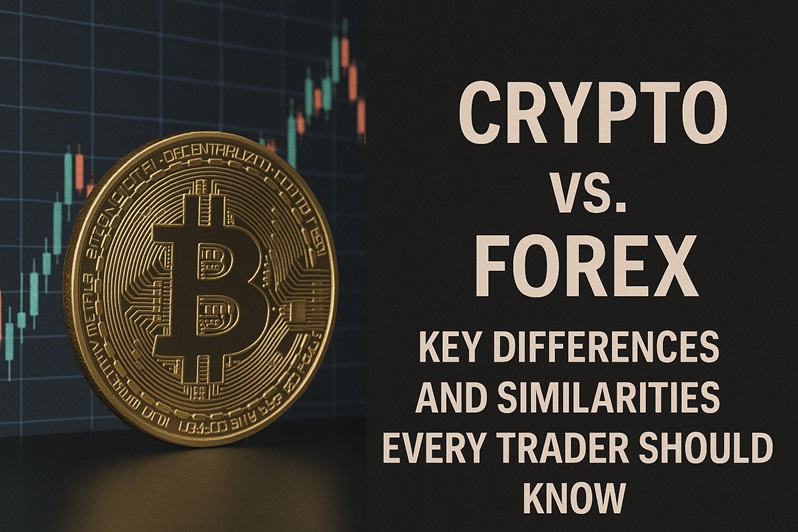
As digital assets gain traction, many traders are expanding their focus beyond traditional Forex markets to include cryptocurrencies. While both markets offer exciting opportunities, they operate under different dynamics. Understanding the key differences and similarities between crypto and Forex trading is essential for making informed decisions and optimizing trading performance. Whether you’re transitioning from one market to the other or exploring both, having clarity on how they compare is a crucial step.
Market Structure and Operating Hours
One of the most obvious differences between the crypto and Forex markets is their operational structure. Forex markets operate 24 hours a day, five days a week, with activity following global financial centers like London, New York, and Tokyo. In contrast, the crypto market never sleeps—it’s open 24/7, including weekends and holidays.
This constant accessibility in crypto can lead to greater flexibility for traders, but it also introduces the risk of market-moving events occurring at any time. Forex markets, being more structured, often revolve around key sessions, with notable spikes in volatility during overlaps between major time zones. Understanding these timing differences is crucial when planning trading strategies and risk management.
Liquidity, Volatility, and Regulation
Forex markets are among the most liquid in the world, particularly major currency pairs like EUR/USD or USD/JPY. This high liquidity typically results in tighter spreads and lower slippage. The crypto market, while growing rapidly, remains more fragmented, especially for altcoins, which can experience sharp price swings due to lower trading volumes.
Volatility is another major differentiator. Crypto assets are known for dramatic price fluctuations, which can lead to significant profits or losses in short periods. While Forex markets also experience volatility, it tends to be more moderate and influenced by macroeconomic factors such as interest rate changes, inflation reports, and central bank policy.
Regulation also sets these markets apart. Forex trading is overseen by established regulatory bodies, and brokers are often licensed and subject to compliance standards. In contrast, the crypto space remains less regulated globally, which creates both opportunities and risks. Traders must take extra care when selecting crypto exchanges and managing security.
Trading Strategies and Tools
Despite their differences, both markets share common technical foundations. Traders use similar tools—like support and resistance levels, trendlines, and indicators such as RSI, MACD, and moving averages—to analyze price action and identify opportunities.
However, the speed and nature of trade execution can vary. Forex traders typically operate through brokers using platforms like MetaTrader, while crypto traders often execute trades directly on exchanges. This distinction can impact strategy implementation, especially for automated or high-frequency trading systems.
Sentiment and news also influence both markets, though with different triggers. Forex markets react to economic data and geopolitical developments, while the crypto market is more sensitive to technological innovation, regulatory updates, and community-driven sentiment. A successful trader in either market must stay informed and adaptable.
Conclusion
Both crypto and Forex markets offer unique advantages and challenges. Forex stands out for its liquidity, structure, and regulatory framework, while crypto shines with its accessibility, innovation, and volatility. Understanding the distinctions and commonalities between these markets empowers traders to build strategies tailored to their goals and risk profiles. Whether you trade one or both, informed decision-making is the key to consistent success.
FAQs
Can I use the same trading strategies in both markets?
Yes, many technical strategies apply to both, but they may need to be adjusted for volatility and liquidity differences.
Which market is better for beginners?
Forex offers a more regulated and stable environment, making it generally more beginner-friendly.
Are crypto markets more volatile than Forex?
Yes, crypto markets typically experience more frequent and larger price swings.
Is it safe to trade cryptocurrencies?
With proper research, secure platforms, and risk management, crypto trading can be safe, though it carries unique risks.
Do I need different tools to trade in each market?
Yes, Forex traders often use broker platforms, while crypto traders operate through exchanges and Web3 tools.
